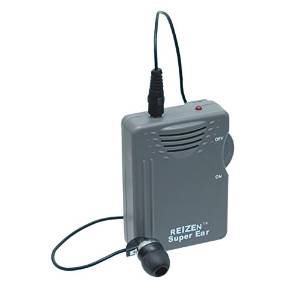Comfort
Some individuals may find this device more comfortable to wear than the over-the-ear style, particularly if they have tried a hearing aid type device and had trouble with the small batteries or the feel of it. The Loud Ear is simple to operate and is easy for users who have joint pain or arthritic fingers. The consensus from most reviewers is that you will probably want to invest in better headphones than the earpiece that comes with this aid, as it is tiny and uncomfortable for most users. The unit does have a standard sub-mini audio plug that is wired so that amplified audio can go to both the left and right earpiece if you choose to replace the single earbud with headphones. You can also clip the Reizen to your belt or clothing, so it is great for mobility and can be removed easily. Also since it is a larger device, there is less chance of losing it compared to the over-the-ear models that are easy to lose.
Sound Quality
This is a sound amplifier, (not a hearing aid) so if there is any other noise in the room, it is amplified as well as what you are listening to. If you have never used a sound amplifier before this can take some getting used to. In a way, you have to retrain your ears to adjust to this type of device. For some users, this is fine, but others can find it very difficult and they may want to look into a device that can let you customize the sound a little bit with tone control, which the Reizen does not offer. The Reizen claims to have a dB gain of 120, but since you are only really able to change the volume, there is a pretty good chance that you are going to be getting a lot of feedback if you do manage to get the 120 dB gain.
Warranty
The Reizen Loud Ear has a 90-day manufacturer’s warranty.
Sound Customization
There isn’t much in the way of sound customization on the Reizen, you can adjust the volume with the volume wheel, but there is no option to remove ambient noise, or adjust tone. If you are using a hearing amplifier to help with hearing loss, you will probably find that you are going to want some amount of customization in an amplifier. You may want to consider something like the Willam Sound Pocketalker, which is more expensive but still relatively cheap in comparison to hearing aids.
Battery Life
This model uses 2 AAA batteries, and the battery life is approximately 48 hours, which is on the low side for a handheld pocket amplifier. If you do go with this model, you may want to invest in rechargeable batteries or purchase batteries in bulk since it does eat up a lot of battery power.
Amplification Level
The Reizen has a reported amplification gain of 120 dB acoustic gain, which is unusually high, and probably needs to be taken with some level of skepticism. If the gain is indeed that high, you are probably going to be getting a lot of feedback as you raise the volume level on such an inexpensive device. You use a wheel on the side of the device to control the volume. Since it is an amplifier, the device will pick up a lot of ambient and background noise. It does amplify sound, but many reviewers report it to be quite tinny with some amount of echo.
Overall
The Reizen Loud Ear may be a good option for some users. It is excellent for people who are unable or unwilling to spend a lot of money on hearing aids or higher end hearing amplifiers and are instead doing without. It can work well for one-on-one conversations and TV watching. It is also an easy to use and uncomplicated aid for elderly users who might refuse to wear hearing aids or have hearing aids but don’t want to wear them at certain times (i.e., at night in bed while watching TV) or just to keep on hand as a backup. If you are someone who does not like to wear the over-the-ear style of hearing aid, handheld devices are an excellent alternative.
Some of the links in this post may be affiliate links (meaning the site gets a few pennies when you spend a dollar).
- The Best Hearing Amplifiers of 2021 - October 23, 2020
- Best TV Soundbars for Hearing Impaired - October 23, 2020
- Hearing Devices to Help People in Nursing Homes and Hospitals - October 23, 2020




